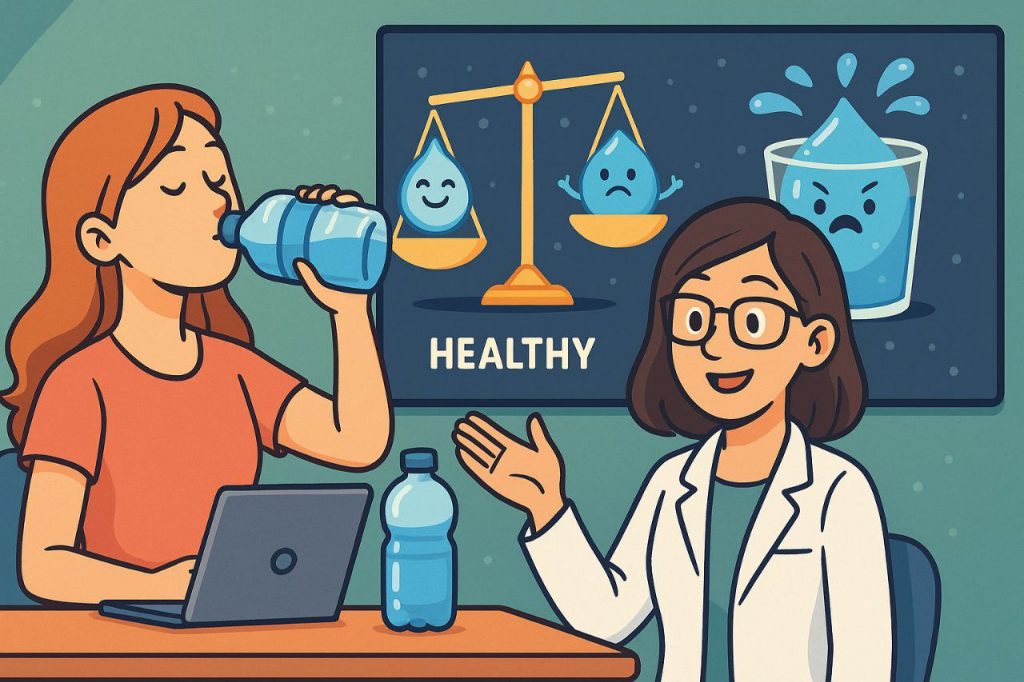Water is essential for life — it regulates body temperature, supports cellular functions, and helps eliminate toxins. However, while dehydration is a well-known risk, overhydration or water intoxication is a lesser-known but potentially dangerous condition. Drinking excessive amounts of water in a short period can disrupt the body’s delicate electrolyte balance, leading to serious health consequences. Understanding how and why this happens is key to maintaining optimal hydration without endangering your health.
What Happens When You Drink Too Much Water
When a person consumes large volumes of water rapidly, the kidneys — which typically filter about 0.8 to 1.0 liters per hour — cannot eliminate the excess efficiently. This causes the concentration of sodium in the blood to drop below normal levels, a condition known as hyponatremia. Sodium plays a critical role in maintaining fluid balance inside and outside cells. When sodium levels fall too low, water moves into cells, causing them to swell. This cellular swelling can be particularly dangerous in the brain, where it increases intracranial pressure, leading to headaches, nausea, confusion, seizures, and, in extreme cases, coma or death.
How Much Water Is Too Much?
There is no universal amount of water that is “too much,” since individual needs depend on factors like body size, physical activity, temperature, and diet. However, experts such as the European Food Safety Authority (EFSA) and Mayo Clinic recommend that adults generally need between 2 to 3 liters per day. Problems arise when individuals drink several liters within a short period — often under the misconception that “the more water, the better.” For example, consuming more than 4 liters in under two hours without sufficient sodium intake can cause hyponatremia. Athletes, marathon runners, and soldiers are particularly at risk because they may replace lost fluids without replenishing electrolytes.
Medical and Scientific Perspectives
According to Dr. Tamara Hew-Butler, an exercise physiologist and expert on hyponatremia, “The human body has an excellent thirst mechanism — overdrinking is a modern behavior driven by misinformation.” She explains that the kidneys can efficiently regulate fluid balance when we drink in response to thirst rather than habit. Similarly, a study published in the New England Journal of Medicine found that exercise-associated hyponatremia is more common than dehydration during endurance sports events. Scientists emphasize that while adequate hydration supports health, excessive intake can overwhelm the body’s regulatory systems.
Signs and Symptoms of Overhydration
Early symptoms of overhydration often resemble dehydration, making it difficult to recognize the problem. They may include nausea, fatigue, muscle cramps, and light-headedness. As the condition worsens, neurological symptoms like confusion, irritability, and seizures may appear. In severe cases, fluid accumulation in the lungs and brain can lead to respiratory distress or death. Physicians diagnose water intoxication by measuring serum sodium levels and checking for electrolyte imbalances through blood tests.
Prevention and Safe Hydration Practices
The best way to avoid overhydration is to listen to your body. Thirst is the most reliable indicator of when to drink water. During intense exercise or hot weather, balancing water intake with electrolyte-rich beverages or foods such as bananas, yogurt, or coconut water helps maintain sodium levels. Healthcare specialists also recommend spacing fluid consumption throughout the day instead of drinking large amounts at once. Dr. Andrew Mente, a researcher at McMaster University, notes that “moderation and balance — not extreme hydration — are the cornerstones of good health.”
Expert Opinions and Public Misconceptions
Many health influencers promote “detox challenges” that encourage excessive water drinking, claiming it flushes out toxins or improves skin health. However, experts warn that this advice is misleading. The liver and kidneys are already efficient at detoxification, and excess water provides no additional benefit. In fact, it can strain these organs and dilute essential nutrients. Psychologists also note that some individuals develop psychogenic polydipsia, a behavioral disorder characterized by compulsive water drinking, often linked to anxiety or obsessive habits. Medical supervision is crucial in such cases.
Broader Implications for Health and Society
The global wellness industry has popularized hydration tracking and “water goals,” sometimes leading to unhealthy competition or misunderstanding of hydration science. While these habits can raise awareness of proper fluid intake, they can also create fear of dehydration and promote overconsumption. Schools, workplaces, and fitness programs are increasingly adopting science-based hydration guidelines that emphasize quality (clean, mineral-balanced water) over sheer quantity. The key message from researchers is clear — balance and awareness are far more important than chasing arbitrary hydration targets.
Interesting Facts
- The kidneys can excrete about 1 liter of water per hour, but no more.
- Hyponatremia is sometimes called “water poisoning.”
- One of the first recorded deaths from water intoxication occurred during a radio contest in 2007 called “Hold Your Wee for a Wii.”
- Some marine mammals, like whales, never drink water — they obtain all hydration from food metabolism.
- Electrolyte imbalance, not dehydration, is the main cause of fatigue during long sports events.
Glossary
- Hyponatremia – A condition where blood sodium levels drop below normal, leading to fluid imbalance in the body.
- Electrolyte – Minerals like sodium, potassium, and calcium that help regulate nerve and muscle function.
- Overhydration – Excessive water intake that exceeds the body’s ability to eliminate fluids.
- Psychogenic Polydipsia – A psychological disorder causing compulsive water consumption.
- Serum Sodium – The concentration of sodium ions in the bloodstream.
- Intracranial Pressure – The pressure within the skull caused by swelling or fluid buildup in the brain.
- Homeostasis – The body’s natural process of maintaining internal stability, including fluid balance.
- Osmosis – The movement of water across cell membranes in response to solute concentration differences.
- Detoxification – The natural elimination of toxins from the body, primarily through the liver and kidneys.
- Hydration Balance – The equilibrium between water intake and excretion necessary for health.


